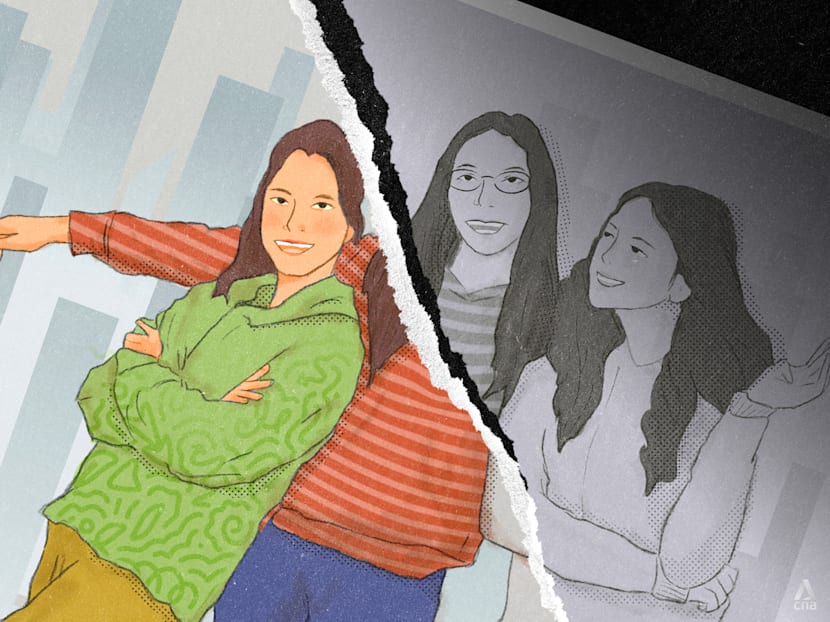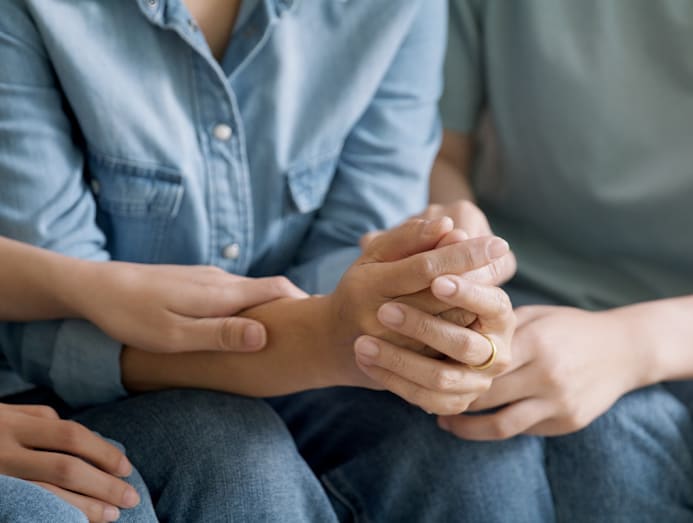In my middle age, I’m learning to appreciate the friends who show up – and let go of those who don’t
How do you handle friendships that no longer fit? As she enters middle age, Ms Deborah Giam reflects on the necessary discomforts of pruning one’s most intimate connections in life.

Ms Deborah Giam used to think letting go of a friendship would be dramatic, but now she sees that it happens much more quietly and unassumingly. (Illustration: CNA/Samuel Woo)

This audio is generated by an AI tool.
I used to think letting go of a friendship would be dramatic. In my younger days, I pictured relationships ending because of a fight, a confrontation, a "break-up" conversation.
Now, at the age of 45, I've accepted the truth: That the end of a friendship is rarely loud.
Over the course of my life, I've collected friendships like mementos – from childhood, from intense stretches of work or shared parenting seasons, travel escapades and much more. I've counted among my friends creative collaborators, people I've laughed with, cried with, and trusted deeply.
Some of these friendships have grown with me, weathered life's messiness, deepened with age and understanding. Others have slipped into the background, like music you don't notice fading out until you realise it's gone completely.
What I didn't expect is how often these shifts happen without a fight. A slow bleed of shared meaning. Different timelines. Different priorities. A slowly vanishing sense of emotional resonance.
There's no breaking. Just… distance.
MOMENTS OF TRUTH
The older we get, the more we need support systems.
The 2024 National Poll on Healthy Aging by the University of Michigan in the US found that 86 per cent of adults over 50 say they have at least one close friend. Those with close friendships are more likely to report good mental health at 85 per cent, versus 59 per cent of older adults with no close friends.
People with fewer close friends were more likely to feel isolated – 45 per cent with either just one or no close friends versus 17 per cent with three or more.
There's no doubt that friendships are one of the most important aspects of life. But they're also strangely easy to lose perspective on without realising it – until something earthshaking happens.
When I lost my husband very suddenly in 2019, I started to see the landscape of my friendships very differently.
My husband’s death was an unexpected trauma. Travelling alone from Singapore to Kuala Lumpur, Malaysia, for work, he suffered a fatal stroke mid-flight.
To say it was a shock would be an understatement. When I got the call, I even thought it was a prank at first.
Most of that period is still a blur in my mind, but I vividly remember the friends who showed up.
Some offered to fly over to Kuala Lumpur with barely a moment’s notice. Some made efforts to check in, gently but frequently.
A group even came together to cook dinner and offer support the day we landed back in Singapore. They were at my house before I had even made it back from the airport.
Seeing their faces after such brutal days was like a balm for my soul. Not the kind that fixes things – but the kind that tells you you’re not alone in the wreckage.
Just as clearly, I remember the ones who didn't show up and – perhaps worse so – the ones who reached out more out of curiosity than care. They weren't really trying to offer me support in my time of need; they just wanted to find out what had happened, from the "source" itself.
One said, in what they must have thought was an honest moment, "Well, I never really liked him anyway."
Another offered, "Come over if you need a drink." Maybe it's just me, but if someone is grieving, you go to them, not the other way around.
The day after the wake, someone came to me saying they had a few questions. I wasn't expecting them to arrive armed with about 15 of them – most serving no purpose other than to satisfy their own curiosity.

It's truly in those moments, when the dust has settled and the noise has faded, that you see who has been standing quietly beside you the whole time.
But what about the rest?
LETTING GO ISN'T CRUEL. IT'S CLARITY
Psychologist Laura Carstensen’s socioemotional selectivity theory explains that as we get older, we become more selective about our social circles. We naturally shift towards emotionally fulfilling relationships because time feels more precious.
A 2025 study published in the Archives of Gerontology and Geriatrics backs this up, finding that emotional closeness and positive friendship quality are strongly associated with life satisfaction in older adults. In contrast, negative aspects of friendships – like conflict or emotional strain – had the opposite effect, particularly in those over 65.
Letting go of such friendships is not only natural – it's good for us. Still, it doesn't make it easy.
Sometimes letting go can be quiet. Maybe you leave a group chat. Perhaps you decide to simply stop reaching out to someone.
Whatever it is, it's often a decision made not in anger but in emotional self-preservation.
There's grief, of course, for the years of friendship you spent together. It's almost like mourning a romantic relationship. You think back on the way things used to be – the inside jokes, the shared celebrations of birthdays and other milestones, the late-night messages.
Often, you wonder if letting it go might have been too dramatic or harsh a decision.
Then you remember how one-sided the friendship had become. Maybe you realise that you were always the one initiating contact, the one making all the effort to keep the connection alive. Maybe you realise that they barely ever asked you about yourself or your life.
You start asking better questions: Does this friendship still reflect who I am? Do I feel seen in this space? Am I giving out of habit, or from a place of genuine connection?
And you realise: Peace shouldn't feel this hard to earn.
Letting go is not about blaming others for what they couldn't give. It's about recognising what you need – and being honest about who can meet you there.
FEWER, DEEPER, REALER
These days, I crave friendships that are soft around the edges and strong at the core. Bonds that don't need constant tending, yet always feel alive. Connections where there's space for silence, for truth, for showing up as my messy, imperfect self in all her honesty.
My circle is smaller now, by design. The people in it aren't the loudest, flashiest, or most available.
But they're consistent. They're thoughtful. They remember the big things and notice the little ones. They don't flinch at sadness or complexity. They don't keep score. They show up with grace and stay through the mess.
I've also begun to understand that some past friendships were just meant for a specific time. They were right for me in that moment in time and served their purpose, offering joy or comfort or connection when it was needed. And then, they passed.
That doesn't mean they failed. It means they were complete.
What I want now are friendships that mirror how I move through the world: slower, deeper, more intentional. Not transactional. Not stagnantly rooted in the static past but sustained by shared values.
It's taken me over four decades, but I now understand that real friendship doesn't always look like a constant presence. Sometimes it's a message that lands right when you need it. Sometimes it's a long pause with no guilt. Sometimes it's someone holding the door open to let you return when you're ready.
At this age, I no longer have time for half-hearted connections. I want mutual energy, mutual care and mutual joy.
Instead of crowding up my life with connections that no longer give me space to grow and stumble, I'm going to focus on making my own space for the friendships that feel like coming home.
Deborah Giam is a communications specialist and a mother-of-one.
If you have an experience to share or know someone who wishes to contribute to this series, write to voices [at] mediacorp.com.sg (voices[at]mediacorp[dot]com[dot]sg) with your full name, address and phone number.












